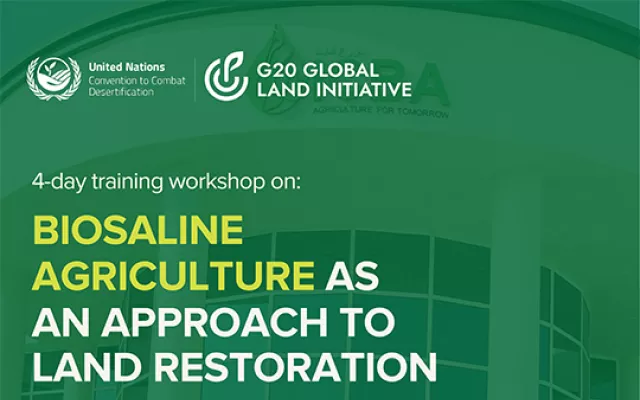Leading experts call for more action to fight climate change impacts in Somalia
3 April 2018
A group of high-ranking experts have called for more partnerships to fight vagaries of climate change in Somalia, which has been suffering from effects of recurrent droughts since the 1980s.
The experts were speaking at a seminar titled “Partnerships for building resilience to drought and climate change impacts in Somalia”, which was co-organized on 3 April 2018 by the Ministry of Agriculture and Irrigation, the Federal Government of Somalia, the International Center for Biosaline Agriculture (ICBA), the International Fund for Agricultural Development (IFAD) and the Somali Disaster Resilience Institute (SDRI).
The event was organized on the sidelines of the 43rd Annual Meeting of the Islamic Development Bank (IsDB) Group in Tunis, Tunisia.
The seminar, among other things, discussed how partnerships between IsDB and its partners can develop the in-country drought response capacity, so that actions are proactive and based on risk management rather than reactive and based on crisis management; introduce and scale up climate-smart agriculture to ensure food security and strengthen resilience in areas vulnerable to drought; and implement development programs in fragile and conflict-affected states such as Somalia by working in partnership with local stakeholders.
Some of the key objectives of the seminar included creating awareness on the climate change impact in Somalia; discussing the prospects of partnerships with Somalia among IsDB member countries; linking donors and international organization to support local institutions in Somalia; and introducing an integrated drought resilience system as a solution to combat drought and climate change in Somalia.
The event was attended by around 40 participants including policymakers of IsDB member countries; regional and international donor agencies; regional and international research organizations; and national research organizations and academia of IsDB member countries.
While introducing the concept note on developing an integrated drought resilience system for Somalia, Dr. Ismahane Elouafi, Director General of ICBA, said: “The reason for low productivity of Somalia is similar to many other African countries. It includes a high level of vulnerability to climate shocks, lack of good quality seeds and fertilizers, lack of suitable stress-tolerant varieties, environmental degradation, and post-harvest losses. The project we have put together is a three-year project with objectives to develop an in-country capacity to use available drought monitoring and early warning system, and to identify areas which are most vulnerable to drought under climatic conditions.”
“The project will be a pilot to showcase what we can do by identifying a few communities to target our interventions. Under the project, drought-tolerant crops and varietal diversity in combination with climate-smart agriculture will be introduced along with soil and water management packages in the selected (vulnerable) areas. Moreover, we will be also developing capacities of the Ministry of Agriculture in Somalia, and agricultural workers and farmers,” she added.
For his part, Prof. Abdirisak Ahmed Dalmar, Executive Chairman, SDRI, said: “Somali communities are facing great climate change challenges. SDRI together with ICBA will work with vulnerable communities in marginal areas of Somalia to help them lead a sustainable and resilient agro-pastoral livelihood."
Somalia is particularly vulnerable to the impacts of drought not only because of the heavy reliance on rain for its water and food security systems, but because of the present fragility of communities, government and the environment. The current drought (2015-18), allied with the impacts of the ongoing conflict and instability, has forced people to migrate and seek shelter in internally displaced persons camps, where they are deprived of productive opportunities and mostly depend on handouts.
The recent calls for international disaster relief have been accompanied by appalling statistics on the devastating impact on people, agricultural and water systems, and the economy. The United Nations has warned that if rains fail again and urgent international action is not taken, the country could see a repeat of the 2011 famine.
At ICBA, climate change has been one of the main focus areas for nearly two decades and some of the key objectives of the program include determining and quantifying the likely impacts of future climate conditions on water resources and agricultural systems to support decision-makers in developing adaptation strategies, management and investment plans and policies; developing adaptation and mitigation plans for vulnerable regions to improve access to water and ensure food security; and developing climate-smart technology packages focused on improved water management and development of salt- and drought-tolerant crops for food, fodder, fuel and fiber that can be used as part of adaptation plans.
This year’s theme for the 43rd Annual Meeting of the IsDB was about partnerships. The event which was held in Tunis on 1-5 April 2018 served as a great platform to exchange ideas and form partnerships for a more sustainable world. It attracted over 2,000 participants and included 200 speakers, 100 topics and 50 sessions.











